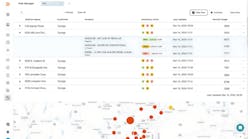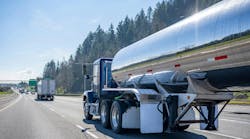The United States should change its infrastructure funding from indirect motor fuel taxes to direct mileage-based fees, and increase the federal gasoline tax and the federal diesel tax to aid the transportation system in the short-term, the National Surface Transportation Infrastructure Financing Commission said recently.
"With the expected shift to more fuel efficient vehicles, it will be increasingly difficult to rely on the gas tax to raise the funds needed to improve, let alone maintain, our nation’s surface transportation infrastructure," said Robert Atkinson, chair of the commission and president of the Information Technology and Innovation Foundation.
According to the commission's Paying Our Way: A New Framework for Transportation Finance report, the total number of miles traveled by automobiles increased 97% from 1980 to 2006 while the miles traveled by trucks increased 106%, but the total number of highway lane miles has grown only 4.4% and real highway spending per-mile travelled has decreased nearly 50% since the late 1950s.
Because of the excess travel with less financial support for maintenance and expansion, more than half the miles Americans travel on the highway system are on roads that are in less than good condition and more than one-quarter of US bridges are structurally deficient or functionally obsolete, the report stated.
The report said that any transportation plan must support enhancing mobility for all transportation system users; generate enough resources to meet and sustain national investment needs; cause direct beneficiaries to bear the full cost of use; encourage efficient investment in the system, and support energy independence and environmental protection. It also noted that the economic stimulus package, while helpful in the short-term, will not solve the longer-term problems of the funding system.
To address the immediate federal funding crisis, the commission suggests the enactment of a 10-cent increase in the federal gasoline tax and 15-cent increase in the federal diesel tax, indexed to inflation. In addition, it suggest, doubling the heavy vehicle use tax, which has not increased since 1983, while maintaining the current sales tax on tractors and trailers and adjusting the fees the entire trucking industry pays into the Highway Trust Fund.
The long-term recommendations, which the commission hopes can be completely implemented by 2020, would eliminate the current fuel and vehicle-related charges as the primary funding source for the surface transportation system, which it said is not sustainable. The commission said its “21st century”-focused plan not only implements a user-based system but also will facilitate the installation of technological advances that will deliver real-time information to drivers geared to help reduce congestion, improve safety and reduce emissions, while giving data to system managers for improved monitoring and management of the allocation of transportation infrastructure resources.
In addition, the report advocates facilitating non-federal investment through expanding the ability of states and localities to impose tolls on the Interstate System; supporting standardization of tolling and information systems, and encouraging private-sector financial participation.
The report also addressed the increasing insolvency of the Highway Trust Fund, noting that its revenues are estimated to be $32 billion annually compared to required investments totaling nearly $100 billion. According to the commission, the problem will only worsen until Congress addresses the fact that current revenues simply are inadequate to support current federal program spending levels.








